#lance corporal rivaille
Text


LEVI IS SUCH A GOOD DADDDD😭😭😭😭😭😭
#UGHHHHHHHHH#ughhh#levi ackerman#levi aot#snk levi#captain levi#captain levi ackerman#levi rivaille#rivaille ackerman#rivaille heichou#lance corporal rivaille#levi attack on titan#dadvi#levi.pic
540 notes
·
View notes
Text
A.I. Levi has me weak and I needed to share 😩

also
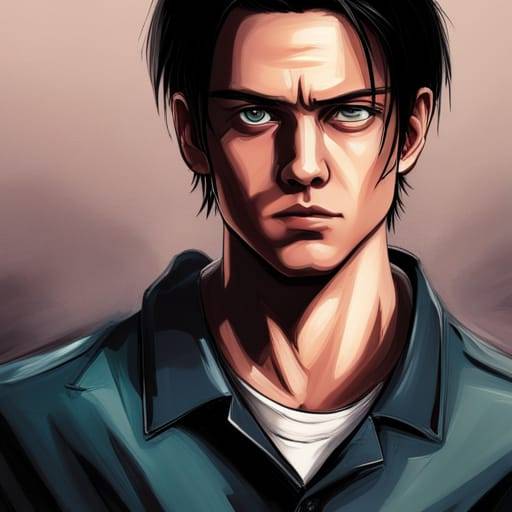
idk who created ai but blessings on you and your house

#levi#levi ackerman#levi x reader#aot#attack on titan#snk#shingeki no kyojin#eren jaeger#rivaille ackerman#levi rivaille#lance corporal rivaille#levi aot#snk levi#levi x you#levi snk#captain levi#levi art#aot art#ai art#ai artwork
33 notes
·
View notes
Text

#ko fi support#myart#levi ackerman#levi art#leviedit#levi x you#snk levi#levi fanart#levi attack on titan#levi x reader#levi aot#captain levi#shingeki no kyoujin levi#levi ackerman smut#levi ackerman fanart#levi and hange#rivai levi aot#rivetra#rivaille ackerman#lance corporal rivaille#rivaille x mikasa#rivai#levi rivaille#rivaille heichou#levi x petra#mikasa x levi#petra ral#petra x levi
32 notes
·
View notes
Photo
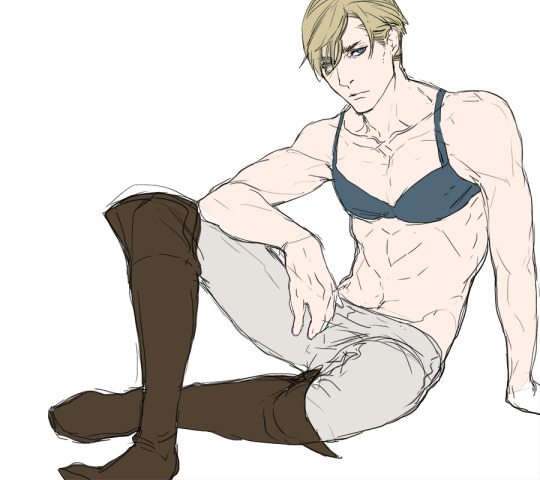
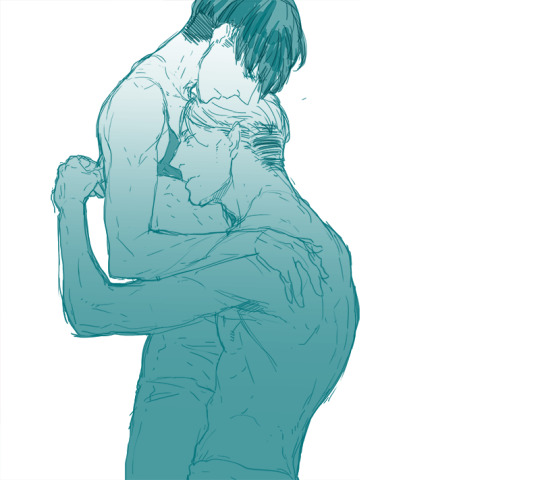
♥
#eruri#shingeki no kyojin#attack on titan#levi heichou#erwin smith#snk#erwin x levi#lance corporal rivaille#rivaille heichou#commander irvin
492 notes
·
View notes
Photo

I can’t seem to decide which Eren I prefer best…. Long hair, short hair?
So Levi is giving him a strange haircut XD
#ereri#definitely ereri#Eren Jaeger#Levi Rivaille#sketch#lance corporal levi#yaoi#otp#AoT#lance corporal rivaille#ship#this ship is killing me#cute boys#riren#my art
187 notes
·
View notes
Photo




“... the boy with the dark shock of hair and broad shoulders, with eyes gray and cool as December and a smile as bright and warm as June. “
#LEVI ACKERMAN#levi#levi gif#levi gifs#levi ackerman gif#levi ackerman ova#kuinaki sentaku#attack on titan#shingeki no kyojin#aot#snk#snk ova#farlan church#isabel magnolia#heichou#Levi Heichou#lance corporal levi#levi smiles#lance corporal rivaille#rivaille#aot levi#ackermans#kuinakisentaku#attack on titan ova#snk graphic#aot graphic
181 notes
·
View notes
Text
The floor is the scene where Levi sits on Eren’s bed and apologises to him getting animated

#eren yaeger#levi#levi ackerman#rivaille#captain levi#lance corporal rivaille#corporal levi#levi heichou#eren jaeger#eren jäger#the uprising arc#snk season 3#aot#shingeki no kyojin#attack on titan#ereri#riren#rivaere#eren x levi#eren x rivaille#hange zoe#hanji zoe#erwin smith#mikasa ackerman#armin arlert#jean kirschstein#marco bodt#mike zacharias#the survey corps#the wings of freedom
762 notes
·
View notes
Photo

Where are you now?
Are you lost?
Will I find you again?
Are you alone?
Are you afraid?
Are you searching for me?
Why did you go? I had to stay
Now I'm reaching for you
Will you wait? will you wait?
Will I see you again?
You took it with you when you left
These scars are just a trace
Now it wanders lost and wounded
This heart that I misplaced
Please like or reblog ( preferably reblog ) if you would be interested in writing with a semi-selective, anti oc, indie, multiverse & multiship Levi Ackerman from the Shingeki no Kyojin fandom ~ written by Katana
#aot#snk#attack on titan#shingeki no kyojin#levi ackerman#corporal levi#corporal shorty#levi rivaille#lance corporal rivaille#aot roleplay#snk roleplay#attack on titan roleplay#shingeki no kyojin roleplay#levi ackerman roleplay#corporal levi roleplay#corporal shorty roleplay#levi rivaille roleplay#levi heichou#levi heichou roleplay#lance corporal rivaille roleplay#aot rp#snk rp#aot rp account#aot roleplay account#aot roleplayer#snk rp account#snk roleplay account#snk roleplayer#attack on titan rp#attack on titan rp account
16 notes
·
View notes
Quote
I just need ereri/riren to be canon
me who should be studying instead of thinking about my otp
#eren jaeger#ereri#eren x levi#eren yeager#riren#rivaere#levi ackerman#attack on titan#aot#snk#shingeki no kyojin#ship#shipping#gay ships#lance corporal rivaille#lance corporal levi#please be canon#levi x eren
654 notes
·
View notes
Photo

What did ya' say? 😂
135 notes
·
View notes
Note
PLEASE write about Levi’s mental state, i’m begging you
He’s faced death and precarious situations since he was born, yet he’s still standing strong and hopeful, WHAT THE HELL I LOVE MY SHORT KING
IT'S FINALLY HERE😭im sorry anon i hope you're around to see this and if u are i hope i dont disappoint
the tone in this analysis is so weird because i kept getting caught between 'this is an apa paper no contractions, academic language, double spacing -' and 'this is a tumblr post about a fictional blorbo wtf r u on'
i also use some scientific language i try my best to explain but if this turns anyone off i don't blame them because im unhealthily obsessed
*i'm a third-year undergraduate psychology student w/ a concentration in psychopathology
tw/cw: discussion of childhood exposure to sex (not assault)

Foreword
I’ve been putting this off for a while (I’m forgetful and this topic is intimidating what can I say), but being a year out from graduating with my bachelor’s to become a mental health professional, and being a Levi scholar(/hj), I wanted to give this a shot.
I wanted to dissect and examine Levi Ackerman’s mental health “currently” (as in general canon), and explain as thoroughly but as simply as possible how and why he thinks and acts the way he does.
Seeing how AOT is pretty renowned for leaving out the ‘insignificant’ details, especially character details, a good majority of my assertions and even details of his life are built off of correlations and “signs and symptoms”; meaning some things could be an aspect of Levi’s personality, or a symptom of psychopathology.
I will examine his childhood (especially his childhood), adolescence, young adulthood, and “present” adulthood, with a short summary at the end of where he might be mentally after the war.
*Lastly, I don’t like it when things I say about a series or character are taken as fact or make it implied that someone else’s thoughts are “wrong”. This is partly built on headcanons anyway, which are influenced by my own experiences. Don’t take away from this that this is me telling you what to think.*
Childhood
The most important period of development occurs in infancy and childhood, especially from the ages of 3-6. This is when a child learns where to find security, love, and basic skills, gaining stability as they develop.
Well, Kuchel died when Levi was 4.
Maternal Love / Learning Empathy / Anxious Attachment Style
Levi was born into deep poverty within a violent unwelcoming environment. Basic physical needs must have been very hard to meet (i.e., consistently fed enough, a clean environment, no physical threats). And where Levi was born is like the dictionary definition of a bad environment for a small child, excluding only his mother’s care and love.
As it’s generally understood in canon (and suggested from Levi’s special backstory manga so far) she was a caring parental figure early in Levi’s life that loved him unconditionally. We can conclude that Kuchel did everything within her power to compensate for both parenting Levi alone and shielding him the best she could from his horrible surroundings, teaching the kindness, goodness, and love that Levi would internalize and go on to strive for for his entire life.
As far as we know, no other children lived in the brothel. Socialization is just as important for a young child as receiving love. With this isolation, it’s extremely difficult to learn how to connect to other people, or pick up on social cues. Levi would’ve never learned how to interact properly with his peers—aside from use of aggression and violence which Kenny would go on to instill in him.
With the danger/anxiety imposed by strangers, mostly if not entirely men, he would turn to his mother for comfort all. The. Time.
And she would give him that support and affection of course. This early motherly affection is integral to child development: a child who receives empathy and affection is subliminally taught how to feel and express empathy towards others.
While Levi’s surroundings were dangerous, lonely, and chaotic—traumatizing enough for a toddler or young child—Kuchel provided a safety net from that, so I think that Levi developed an anxious attachment as a child: exhibiting clinginess, excessive fear of abandonment, and an excessive need for security and/or reassurance.
Paternal Trauma / Potential Androphobia
Born and living in a brothel, we can assume that Levi was probably seen as a burden and a mistake by others, especially by men (both the likely majority of her customers and her boss).

AOT ch69; Before the Fall, ch34
This is likely in contrast to the women (those living and working in the brothel like Kuchel). They should know Kuchel if not as friends, then acquaintances who could empathize for her and her son.
There’s an obvious trend here. If Levi is going to feel fear/danger/anxiety because of men, he should have a general aversion to men and-or the behavior of men who he encountered as a child. This is impossible to know for sure or in meaningful detail, but it seemed to be resolved by the time he became an adult if so.
Although Kenny in his words was no more than Levi's teacher, Levi did see him as a father figure.
The subject of Kenny will be expanded on later, but it's clear Kenny in no way resembled a father, who also would go on to abandon Levi (at the age of 11 or so). Children without father figures tend to struggle more emotionally, psychologically, and socially. Specifically, (especially boys) tend to exhibit intimidating/aggressive personas to compensate for resentment, fear, and unhappiness.
Sexual Trauma (Tangent, Probably)
This is unconfirmed but a likely trauma Levi went through: exposure to sex as a child. There’s no way to confirm what he experienced, so I’ll function on ‘probably’s’ and ‘most likely’s’.
Because Levi and Kuchel only lived in one room, other rooms in the brothel should have belonged to other women, and he was at the oldest four, I wager that he was babysat by women who Kuchel knew and/or was made to hide somewhere while she worked, such as in a cabinet.
(for reference)
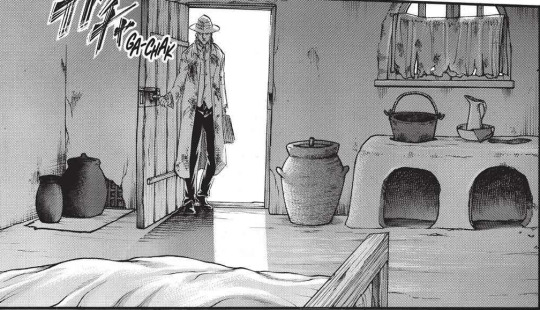
AOT ch69
The odds are high that he was exposed to the aftermath of sexual violence (i.e., marks seen on his mother), and the sound or smells that have to do with it. That young, he wouldn’t know what it was, but he should have realized later as an adolescent.
In general, children regardless of gender exposed to sexual content usually experience early puberty (which is just as likely for impoverished children, or children who experience chronic high-stress in general); issues with intimacy; become desensitized to high-risk behavior; negative/inaccurate expectations about sex and relationships in the future; influence inappropriate behavior with other children or adults; sex addiction.
This is especially relevant to Levi’s fear of closeness/intimacy in the future. Exposure to sexual situations—possibly not including CSA in his case—very early in life inflicts on a child emotions and stress they don’t have the intellect or reasoning to process or understand. An extreme aversion to interpersonal relationships, especially physical ones, results.
This stress Levi must have felt, being powerless to this happening to his mother, is a different beast. Children aren’t capable of handling high levels of stress, and so the brain will automatically create coping mechanisms: dissociation (a severe form of “zoning out”; observing the self “from the third person”; numbness; the feeling of living in a dream), excessive daydreaming/overactive imagination, symptoms of PTSD (nightmares and terrors; flashbacks; spontaneous activation of fight-flight-freeze associated with anxiety; excessive worrying/fear; loneliness/self isolation). PTSD will also be prevalent in Levi’s later life, which I’ll delve into later.
Inappropriate behavior and sex addiction are also highlights for me because they shouldn’t exist in him based on Levi's personality and behavior throughout the series. In my opinion, Levi ought to associate sex with pain, shame, and violence; he does see it as an ordinary job—a means to an end. He should be desensitized to sex as a concept, but associates it personally with shame, sadness, and pain, possibly feeling disgust towards it. So it is highly likely that Levi in every stage of life following this experienced sexual repulsion (usually associated with high anxiety towards sex), a low libido, or a lack of sexual desire entirely.
From a trauma perspective, he could avoid sexual topics of conversation, sexual settings (i.e., brothels), or an array of things which are sexually suggestive or he as a child possibly associated with sex (i.e., cleavage, panties, specific touch). Similarly, he might avoid direct reminders or have a post-traumatic reaction to them, such as anxiety or flashbacks (i.e., the sound of a bed creaking, the sight of wet clothes).
Importantly, it can be concluded that sexual violence was often exhibited, and the idea would be ingrained in him that sex, like everything else besides his relationship with his mother, is “give-and-take”, “victim-and-attacker”, and learn to be repulsed by intimacy. This impacts his willingness for later friendships and relationships as we’ll see later.
Early Abandonment & Early Exposure to Death
As Kuchel’s health deteriorated, Levi’s sense of security would break down. Availability of shelter, food, and emotional support would be even less secure than before. He might have been providing for Kuchel for some time, even, as it can be gathered that he received little to no help from those around him while she was sick. To whatever length he had to take responsibility and both fear for Kuchel, this would cement a sense of responsibility and guilt in him from the age of just four years old.
He will fail to save her—regardless of the fact that that’s not his responsibility in the first place; a child wouldn’t understand that—and then lose her with nothing he could do to even cushion the blow.
How powerless he must’ve felt. How hopeless. How likely is it that Levi found comfort in joining her? A child his age wouldn’t be able to comprehend death, basing our understanding on Piaget’s theory of cognitive development. To summarize, at the age of six or seven, children aren’t capable of complex, abstract thought like death or the finality of it. But Levi had to learn early.
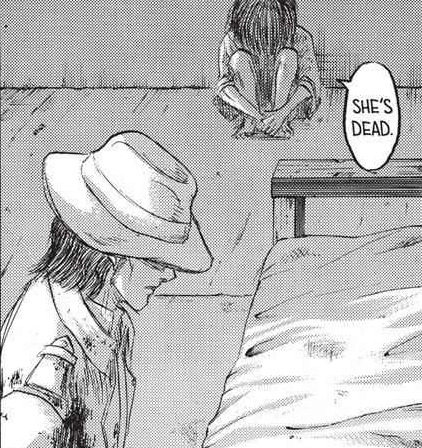
AOT ch69
This will be center in his “clean-freak” tendencies later.
Adolescence
Most of this section is going to be rather vague again, but we already got the bulk of that over with in childhood!
Emotional Train Wreck / Lack of Identity
It’s hard to notice if you’re not paying attention, but in every scene we’re shown with Levi after his mother dies but before Kenny leaves, he’s wearing some variation of his mother’s one dress styled into a shirt. He loves her endlessly, even or especially in death. And part of cherishing her memory, to him, should’ve been taking after her as much as he could.
That’s how to explain why he didn’t become a cruel person (Kenny for instance) as he grew into a teenager, even though much of Levi’s outlook and behaviors come from him (ch57).
The more pertinent question is how extreme violence, reinforcement of the idea that that violence is power, and Kenny’s total (or most likely total) lack of communicated emotional connection affected him.
Levi would still desperately want that connection deep down, especially with his mother gone. This is a major reason why Levi sought to get stronger to please Kenny. For chronically abandoned people, that continues into adulthood and even beyond. A hole inside which can't be filled.

AOT ch69
Chronic loneliness—like I explained before—basically explains his aloof nature and awkward disposition. It’s not that Levi feels as detached as he looks, but he doesn’t know how to express himself or open up. He wouldn’t learn how to process his emotions, let alone talk about them. He’s basically emotionally stunted and immature in impersonal relationships (between friends and especially in regards to intimacy).
The Underground’s environment also makes him socially awkward, rude, of course stoic/not very expressive, and blunt. Levi was forced to become extremely observant of people to suss out their intentions, remaining vigilant of his surroundings at all times.
Levi doesn’t even get affection in any sense anymore. He doesn’t get a hug or a pat on the back, and he certainly doesn’t get a shoulder to cry on.
If anything, Kenny would punish him for showing weakness. Vulnerability is weakness; weakness is death.
What results is a continuous and boundless sense of emptiness inside that can’t be filled. He’s plagued by a chronic sense of unbelonging and loneliness. There’s no time or opportunity to develop “normally” as an adolescent. Socialization is limited at best; thinking of his place in the world is irrelevant when his one and only most pressing goal is survival; he doesn’t get to explore hobbies or interests.
OCD Propensity
One “interest” Levi is passionate about is cleaning, at least. Disease is what caused his mother to die. The easiest cause to point to would be their disgusting surroundings (although, Kuchel was infected by a customer). It is canon that Levi’s love of cleaning comes from "his personal experiences". In that interview, Levi first specifically references the important of fighting disease.
In other words, his "clean freak" nature comes, primarily, from the death of his mother: Filth -> disease -> death, and abandonment by extension.
His mother would’ve encouraged him to keep their room clean. There were times he or she had to have come down with something and dirtiness was the cause. On top of Kenny’s enforcement to keep up “clean” appearances to garner respect from everyone else in the Underground.

This in particular is extremely relevant to his mental health. When someone feels out of control of what is happening to them, especially in a recurring way, and especially as a child who doesn't yet know how to feel stable in an unstable environment, they look for something to control. It can be weight, bodily functions (blinking, breathing, etc), dominance over others, or cleaning, for instance.
Fear of disease, the urgent need to have control, and the basic need for stability makes it obvious that Levi would become obsessed with cleaning. And moreover, developing OCD (Obsessive Compulsive Disorder). I’ll go deeper into this diagnosis later.
Lack of Self Worth
Despite the acknowledgment throughout canon that he trusts in his own strength, it wasn’t always that way.
Canonically, Levi sought praise from Kenny by showing his strength because that was the only thing he received praise for. The conclusion Levi came to once Kenny left him was that he wasn’t strong enough (wasn’t good enough) to warrant staying with him.
In conjunction, Levi’s first conclusion was that he did something wrong, not that Kenny possibly had some obligation that forced him to leave the Underground, pointing again to his own lack of self-worth.
This scenario created a complex in him, the very root cause of Levi’s pain, the very foundation of what Levi would go on to prioritize in adulthood. If he isn’t useful to those he wants not to abandon him, he’s worthless. He’s only useful when he shows his strength. Every other aspect of him like his interests is either irrelevant or bland by default in his eyes.
He would go on to make it his mission to try his best to be good enough in order to save and protect the lives of others, but foremost those he cares about.
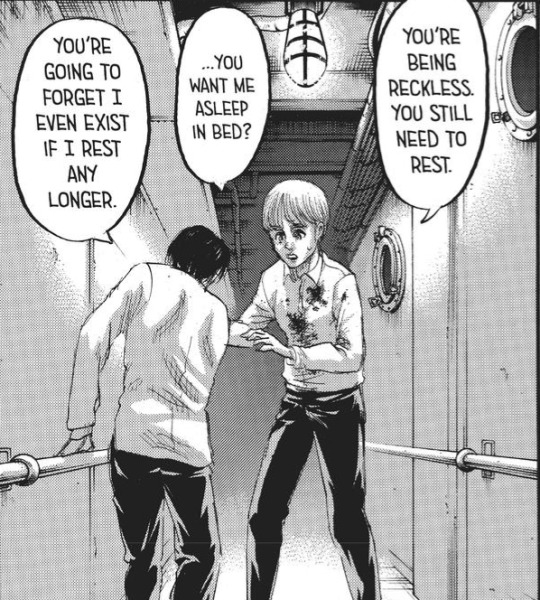
Young Adulthood
Our first exposure to Levi as an adult is in A Choice with No Regrets, his OVA/backstory.
(By the way, I’ll be basing this analysis off a mix of the manga and the OVA.)
Emotional Immaturity/Affective Dysregulation
Generally, Levi’s defining negative character trait as a young adult is his emotional immaturity/anti-social behavior. Yes he’s grumpy and rude which is always indicative of him, but he’s very quick to anger, too. He cursed at the Squad Leader who offended him (by assuming that because he, Isabel, and Farlan are from the Underground, they’d be dirty), and argued furiously with Farlan that he would kill Erwin—not because it was required for the job, but because he disrespected him—for a few examples.
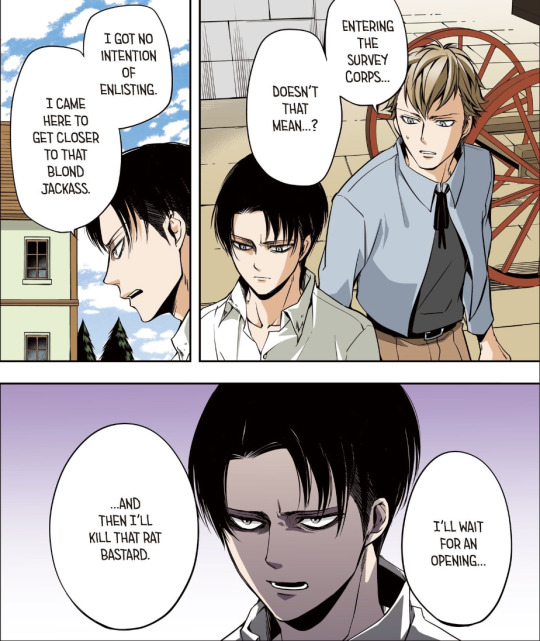
ACWNR ch2
He tended to be arrogant, too. Such as when he ultimately called a Scout who had experience with the Titans stupid for telling Levi to hold his swords in a certain way. He spoke to every officer the same as he would anyone on the street, having a remarkable lack of basic respect for authority. He was insistent on distancing himself from the entire setting and structure of the Scouts as much as possible, both to not get attached, and he found their mission childish/foolish.
He’s rather selfish. There is nothing Levi cares about genuinely more than Isabel’s and Farlan’s lives and the job that will set them up with a good future. Farlan’s advice is the only one’s he takes and the only judgment outside himself that he considers, such as when Farlan asks him to not cause trouble with authority to keep a low profile, but even then he acts stubborn. Levi trusts nobody wholeheartedly except himself (until later in ACWNR).
There’s a cognitive dissonance in him. Growing up, and still as a young adult, Levi’s headspace is marked by fear and uncertainty, with his power as his source of confidence. The first time he kills a Titan (with Isabel and Farlan), he uses too much gas because he refuses to potentially risk his friends’ lives; when the expedition is upcoming, he abruptly tells Farlan and Isabel to find a reason to stay back, and that he’ll complete the dangerous part of the job on his own.
Levi is full of repressed fear and uncertainty. He hides and/or buries all of it for the sake of self-preservation both emotionally and physically.
Antisocial Personality…?
It’s extremely interesting how a character as selfless, heroic, and empathetic as Levi exhibits antisocial symptoms. I’d even argue that if his childhood was spent entirely without his mother figure, then he might be a dictionary definition of ASPD (Antisocial Personality Disorder).
People with this disorder live day-to-day under the constant assumption that whoever is around them is “out to get them”/searching for a weakness to exploit. Humanity is made up of only prey and predators; morals are completely subjective, perpetuated by the society that surrounds them. This constant need to defend oneself, the effect of the exact trauma the potential sociopath experienced, combined with a muted emotional spectrum, results in a complete disregard of everything, including people outside of themself. They might believe they’re entitled to comfort or admiration, but overall, they’re intensely self-serving, often aggressive, and ruthless.
Because Levi for instance learned to rely on violence both for “love” and survival, then he might fall on violence to manipulate a person or situation into serving himself. I see reason to believe that Levi could have grown into worse than Kenny’s image if it weren’t for his mother’s influence.
However, the greatest cause for deniability is Levi’s wide emotional spectrum (especially including empathy and shame), while a lack of shame is the most significant marker of ASPD . (It is arguably one of many testaments to his strength that a victim of so much suffering, violence, and cruelty could become a man as empathetic as him.)
However, these tendencies may still be relevant: A sense of arrogance—both to the way Levi thinks of some who he perceives as weak and live without good morals—lacking issue with using deceit or violence to attain a goal, and living outside the rule of authority.
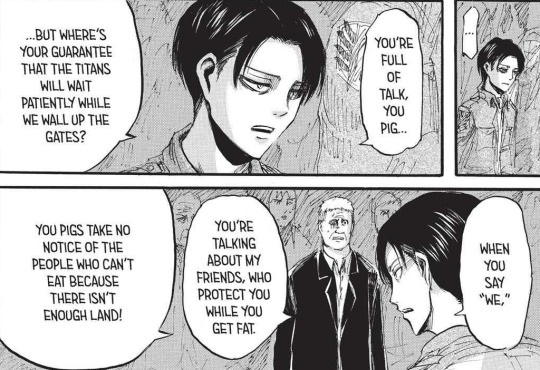
I go into more detail about this idea here.
Conclusion
As is true in general, there’s very little to say of mental development once someone has reached their early–mid-twenties. What we know of Levi’s young adulthood does reinforce his fear of abandonment, but he finds a cause where his strength and compassion can be “put to good use” and give to him a life that is worth living.
Conclusion: the ‘Present’/Diagnoses Overview
C-PTSD (Complex Post-Traumatic Stress Disorder)
Levi’s emotional dysregulation (i.e., inability to sit with and process negative emotions), his difficulties in relationships, insomnia, negative worldview, absent sense of self, and finally, his persistent sense of unworthiness/worthlessness are all indicative of C-PTSD. It’s distinct from PTSD in that he didn’t endure one short-term traumatizing event, but he grew up surrounded by trauma and saw it as normal (e.g., gang violence, extreme poverty, death of a parent, (more presumably) physically and emotionally abusive parental figure). Levi as a child developed no understanding of a nurturing, secure environment.
Negative/Absent Sense of Self
I’ve talked about this at length already, but it’s worth noting how Levi’s perception of himself must have changed when it was revealed that he is extremely strong physically not from his own efforts as much, but because he’s an Ackerman.
His self-confidence and self-worth have always been built on the foundation of his strength. He’s useful if he’s strong, so he’s worthy if he’s strong. Along with the extreme high pressure his goal to kill Zeke put on him in season four, he might have gone to extreme measures to compensate for his strength he might have felt was “unearned” (such as excessive exercise for example). This is an aside, but it was a blow to him for sure.
Emotional Dysregulation
The causes of emotional dysregulation generally which he experienced are as follows: early childhood trauma, feelings ignored, judged, or invalidated at a young age, and physical and emotional child neglect. Beyond his first four years of life with his mother, Levi experienced all these things (early exposure to sex and likely exposure to domestic violence aside).
It’s important to focus on emotional neglect specifically, when any and all perceived “weakness”, no matter how small, is unacceptable to Levi. He will never ask for help (being independent to a fault), he can’t define or process his emotions, and it doesn’t occur to him—and it could be a shock—when he learns that his friends care about him, not him insofar as how useful he is.
As an adult, Levi appears to be emotionally mature, but I argue that this isn’t the case. It’s more accurate to say that he has better control over his emotions (in that he buries them or ignores them) with a mature outlook because of all his experiences with suffering.
Similarly, he’s not outwardly emotional not because he’s antisocial (as related to ASPD, not introversion), but because he’s so “emotionally constipated” that he’s numbed the vast majority of the time.
Relationship Issues + Fear of Abandonment
Because of his fear of abandonment and impaired emotional intelligence in close relational conflict, he’s extremely passive and/or passive aggressive. In order to avoid potential abandonment, he doesn’t go out of his way to win major arguments—such as threatening to break Erwin’s legs if he didn’t stay away from the expedition in season three, but ultimately giving in. He’s also more likely to sneak petty insults into arguments, give “silent treatment”, slam doors, etc. His kindness and exceptional empathy shouldn’t let him be physically or overly violent.
These are likely additions to why Levi doesn’t foster many close relationships.
Fittingly, as a child I thought that Levi might have had an anxious attachment style (clingy, excessive need for security), but as this possibility for security was removed entirely, and he was taught to not rely on others, he would develop more of an overt avoidant attachment in adulthood in combination (fearful-avoidant): making very few emotional demands—even though he has needs—withdrawing when there’s conflict, acting aloof yet fearing abandonment, having difficulty expressing emotions he feels intensely, and fear of depending on someone else.
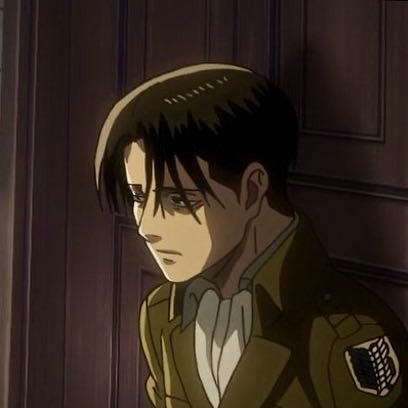
Anxiety
His cool-headedness even in the heat of battle/war (other factors like experience aside) is exactly what you would expect from someone diagnosed with C-PTSD; he’s accustomed to chronic high-stress. But small stressors (i.e., a change of plans) are overwhelming and make him quick to anger/excessive annoyance.
OCD
Emotional dysregulation is also closely associated with OCD.
OCD is much much more than being concerned with keeping clean or organized. OCD is an anxiety disorder composed of anxiety-related obsessions and compulsions, such as frequent and disturbing thoughts or images (intrusive thoughts). These attempt to be managed through rituals (i.e., handwashing, counting in patterns). Although symptoms will fluctuate with anxiety, OCD at its baseline is a distressing disorder.
Since he was young, Levi should have had an incessant need to be in control at all times. A shining example of this is his mother’s death, an incident he couldn’t control but included dirtiness/disease as a cause he could pinpoint, so this anxiety with dirtiness becomes a major obsession, and the compulsion is cleaning. (Putting aside the fact that Levi enjoys cleaning by itself too.)
It’s a widely-held belief that if Levi has OCD, it’s contamination OCD, as it specifically has to do with an obsession with dirtiness and a compulsion in cleaning (i.e., damaging handwashing, ritualized bathing that may take hours). However, based on the multitude of times Levi was covered in blood and remained unbothered by it (Titan and human), and in fact the obsession’s lack of relevance entirely during urgent missions/situations, contamination OCD is simply not plausible. Instead, it’s general OCD.
There’s no way to know for sure, but I don’t see his OCD as mild or severe. Levi is an extremely orderly and balanced person, so it can be concluded he must have things done a certain way, routinely, organizational, or planned; when the dirtiness is “negative” (i.e., Titan blood, blood on a knife he used to kill Isabel’s attackers), he is never more rigid with cleanliness; it’s probable he suffers intrusive thoughts (likely of the violent nature), a fear of contamination, and/or counting ritualistically, but the most obvious compulsion is cleaning. He might have sensory issues, such as disgust if he happens to brush shoulders with a stranger; aversion to particularly bright lights, irrational rage towards “mouth sounds” (i.e., chewing, coughing, swallowing), etc.
EDNOS (Eating Disorder Not Otherwise Specified)
Levi should have a complicated relationship with food to say the least.
In the realm of eating disorders, EDNOS is sort of a catch-all term when an individual doesn’t qualify for the diagnostic criteria of anorexia or bulimia, and it encompasses lesser-known eating disorders like Pica. It’s the most common diagnosis for clinical eating disorders.
I already covered how integral the early years of life are, and beginning at a young age, if children aren’t given a basic need like food, and they must seek out food on their own, it becomes an anxiety deeply rooted in the brain regardless of how well-fed they are when they’re older. There will always be an urge to have food available. Levi’s years in the Underground were spent either actively starving, or going about every single day having acquiring food as top priority. He was a young adult when he left, so it’s impossible to unlearn this (without extensive therapy, which Levi doesn’t seek). It’s similar to compulsions found in OCD: even though he logically knows that there will be a dinner after lunch, it’s impossible to put aside this worry.
That may mean always having food stashed, eating too much—especially in his early years Aboveground when he’d eat as much food in a day than he’d eat in a week Underground— stealing food, or eating way too quickly (as someone who lived in a place where food was considered something of a luxury resource and threatened being stolen at any time).
The latter factor contributes to Levi’s suggested preference to only eat alone—joining the fact that Levi only eats with Erwin after expeditions. Eating in front of others should be considered a weakness to him.
As time passes with this easy access to food, combined with his extremely narrow sense of what makes him “good enough”, his relationship with eating may become toxic. Especially when the stakes of his worthiness are so high—literally life and death. He may think that he’s privileged to eat at all, and when he feels worthless, he restricts himself from that “privilege”.
He may be so accustomed to the feeling of hunger, that it doesn’t immediately register with his mind when he is hungry.
Lastly, he may have a generally low appetite. This is often associated with depression, but depression is comorbid with C-PTSD.
Misc.
Some tangents/miscellaneous speculation about Levi’s psychology:
Queer?
Sexuality is formed and shifts due to a wide variety of factors, which most if not all are terribly understudied: genetics, hormones, and your environment/experiences. So again, my speculation.
With his fear of close relationships and negative experiences with sex, I think he should land somewhere on the queer spectrum, specifically under the asexual or aromantic umbrella (i.e., pansexuality/being panromantic (attraction to personality) and demisexuality/being demiromantic (attraction only to those he has an emotional connection to)).
MDD
The odds of Levi having MDD (major depressive disorder/clinical depression) are iffy. Most if not all of the symptoms are comorbid with childhood trauma and C-PTSD: Such as persistent apathy, guilt, and/or discontent; sleeping too much or too little; lack of energy; reduced or heightened appetite; irritability.
Oftentimes, depression, C-/PTSD, and related mental illnesses cause unexplained physical pain, such as back pain and occasional tension headaches. “Stress hormones” like adrenaline are built-up in the body, and usually persist without physical therapy and-or medication (Disclaimer this mention is based on nothing more than Levi always standing with at least one hand on his hip).
Body Language
Similar can be said of his body language from a cognitive perspective. The vast majority of the time, Levi has himself closed-off in some way, usually by crossing his arms to protect his chest; a subconscious barrier between oneself and another person.
Also see this official art of Levi asleep.
Afterword
We’ve known it’s not just Levi’s physical strength and skill that makes him the strongest, right? It should take immense mental strength to make it day-by-day dealing with the trauma and issues that he does, but not only has he survived and continues to, but he lives heroically, selflessly, with the wellbeing of everyone around him as a top priority. He buries all of his pain by moving forward always and without exception regardless of how painful the present is. Living with “no regrets” should in mental respects be a guise for pushing his trauma down, too; there’s just no words that can properly do Levi’s resilience justice.
Part of me wants to go into detail about his later adulthood, but given how very little we know (right now), I think it’d be too speculative.
However, based on what we have seen at the ending of AOT, it’s comforting to know and plain to see that Levi wasn’t defeated when he “lost” the reason to be so strong, and even his strength itself; he didn’t lose his love for his friends nor of life.
In middle age, based on Erikson’s psychosocial stages, the conflict that should enter Levi’s life is the idea of generativity versus stagnation. He seems satisfied with his life despite the negative effects of all he went through—grief, physical disability, inevitable mental scarring—and he’s still concerned with helping others, especially the younger generation in a world after the overwhelming devastation that was the Rumbling.
My speculated psychopathologies/diagnoses of Levi:
C-PTSD (insomnia prevalent)
OCD (contamination obsessions)
EDNOS
#levi aot#snk levi#levi ackerman#levi attack on titan#captain levi#captain levi ackerman#aot levi#aot levi ackerman#attack on titan levi#aot meta#levi heichou#rivaille heichou#levi rivaille#rivaille ackerman#lance corporal rivaille#levi snk#levi.thoughts#aot#attack on titan
251 notes
·
View notes
Photo

#levi ackerman#attack on titan#shingeki no kyojin#corporal levi#lance corporal rivaille#levi rivaille#wings of freedom
13 notes
·
View notes
Photo

Captain levi <3 I had so much fun on this shoot
Photography: PG Photos Photography
#captain levi#aot#snk#attack on titan#shingeki no kyojin#shingeki no kyoujin season 2#cosplayer#cosplay#levi#riville#lance corporal rivaille#lance corporal levi#levi heichou#captain#freedom#levi cosplay#australia#anime#manga
3 notes
·
View notes
Text

Sketching and playing with watercolor... I never have time for traditional works so this was relaxing :)
#levi ackerman#levi aot#my art#attack on titan#rivaille#lance corporal levi#shingeki no kyojin#my artwork
380 notes
·
View notes
Text

Humanity's strongest soldiers
#shingeki no kyojin#anime#manga#attack on titan#levi rivaille#art#my art#levi ackerman#lance corporal levi#erwin smith#commander erwin#snk#aot#digital drawing#digital art#hange zoe#hange zoë#humanity strongest soldier#erwin deserved to live#hanji zoe#serevq#mikasa ackerman#eren jaeger#eren yeager
188 notes
·
View notes
Photo




We all do this guys,let’s admit it.
#levi#levi ackerman#attack on titan#attack on titan gif#attack on titan season 2#shingeki no kyojin#shingeki no kyojin season 2#snk#aot#levi ackerman season 2#husband#lance corporal rivaille#Rivaille#heichou#babe#help me#anime#snk season 2#aot season 2
807 notes
·
View notes